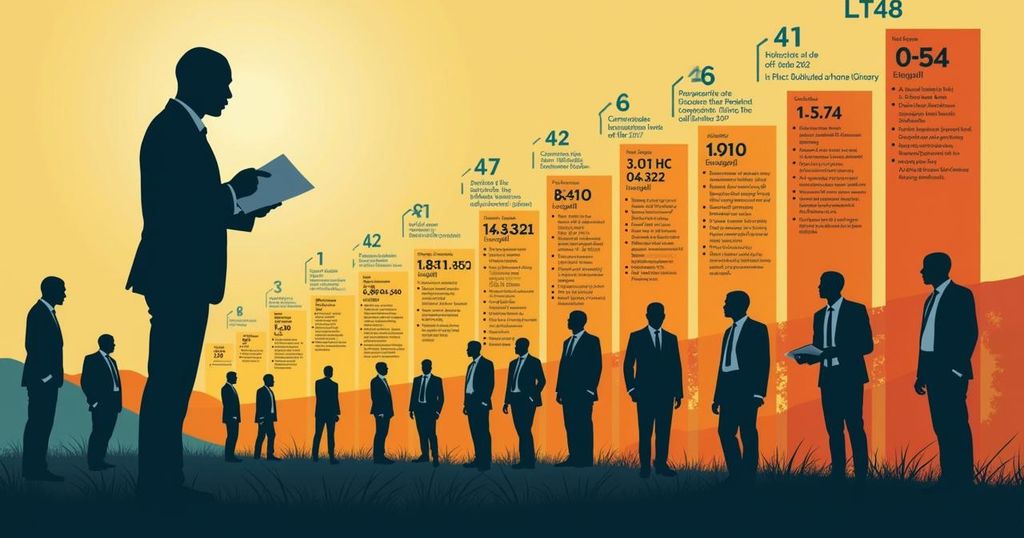Mozambique’s presidential election is set for Wednesday, where nearly 17 million voters will decide a successor to President Filipe Nyusi. Although Frelimo, the ruling party, is expected to remain in power, competition from candidates such as Venacio Mondlane highlights a desire for change amidst ongoing challenges, including a jihadist insurgency, food scarcity, and high unemployment. The election occurs against a backdrop of past election-related violence and corruption scandals that have influenced the political climate.
Mozambicans are poised to vote on Wednesday to select a successor to President Filipe Nyusi, who has completed two terms in office. Nearly 17 million voters are registered in Mozambique, a nation of approximately 31 million individuals, to choose not only the next president but also 250 members of parliament and provincial assemblies. The ruling Front for the Liberation of Mozambique (Frelimo) is anticipated to maintain its hold on power, yet four candidates are vying for change in a country grappling with a protracted jihadist insurgency in the north and environmental challenges due to climate change, such as flooding. The ongoing insurgency has displaced over 1.3 million citizens, while drought has resulted in significant food shortages affecting millions more. Recent local elections were marred by accusations of vote-rigging and violence, yet expectations for a peaceful election process this time around appear to be more hopeful. David Chapo, a former governor of Inhambane province and the presidential candidate for Frelimo, is expected to lead the charge. He is, however, projected to face stiff competition from Venacio Mondlane, an independent candidate supported by the Optimistic Party for the Development of Mozambique (Podemos). Mondlane, a banker and forestry engineer, has made significant inroads with a campaign focused on taking ownership of the nation’s future. The Democratic Movement of Mozambique has nominated Lutero Simango, who aims to resonate with the youth through his policies targeting inequality and employment opportunities. Meanwhile, Renamo, the opposition party initially established as a rebel group, is represented by Ossufo Momade, who succeeded the late Afonso Dhlakama. The jihadist group associated with the Islamic State has conducted savage attacks in the northern Cabo Delgado province since 2017, resulting in severe humanitarian crises, including the destruction of homes and essential infrastructure. Although 600,000 of the displaced have returned to their communities, many face the harsh reality of ruined livelihoods. Candidates have committed to addressing the essential development challenges that have been worsened by the insurgency, notably the suspension of a vital gas project by TotalEnergies in response to ongoing violence. In addition, Mozambique is contending with alarming levels of hunger and unemployment, worsened due to severe droughts attributed to El Niño. The United Nations World Food Program indicates that 1.3 million people are currently experiencing acute food shortages. Frelimo’s ongoing governance has been tainted by corruption scandals, including the infamous “tuna bond” incident which resulted in the jailing of the former finance minister Manuel Chang for taking bribes related to covert loan guarantees for government-run fisheries. This financial mismanagement led to a crisis involving $2 billion in hidden debt, forcing the International Monetary Fund to halt financial assistance to Mozambique. Voting will occur over the course of one day, with immediate commencement of counting, and partial results are expected to emerge shortly afterward. Official results will be disclosed by the National Election Commission within 15 days and will subsequently undergo validation by the Constitutional Council, which will also review any objections raised by participating parties.
This article summarizes the critical upcoming presidential election in Mozambique, which is set to take place on a Wednesday. It outlines the context in which the election occurs, highlighting significant socio-political challenges, including a prolonged jihadist insurgency in northern Mozambique, environmental threats, and the socio-economic crises faced by the population. The piece also details the political landscape, focusing on key candidates from the ruling party and opposition movements, as well as the impact of corruption scandals on public trust in governance.
In conclusion, the Mozambican presidential election is a pivotal event that will shape the country’s immediate future, as it contends with substantial challenges such as political instability, an ongoing insurgency, and severe socio-economic issues. With millions of voters registered and a contested political landscape, the election will serve as a crucial barometer of public sentiment and governance expectations. The stakes are high as candidates promise to address pressing development issues in a nation seeking stability and sustainable growth.
Original Source: abcnews.go.com






